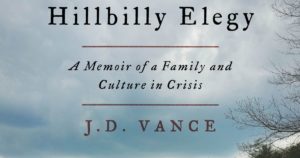In my last post, I mentioned being impacted by J. D. Vance's powerful and tragic book, Hillbilly Elegy: A Memoir of a Family and Culture in Crisis. My wife and I actually read it together -- sort of. I read aloud to her while she crocheted -- a favorite pastime of ours. Although Vance calls the book a memoir, he admits from the start that he's not old enough to call anything he writes by that name. The term 'elegy', a song of lament or mourning, was a harbinger of the emotion I was left with after reading the book. Vance, a Yale Law School graduate now practicing in Cincinnati, seems ambivalent throughout the book toward the subculture in which he grew up in Eastern Kentucky and Western Ohio. On the one hand, he is not afraid to call out the tragic flaws and shortcomings of what he unabashedly calls hillbilly culture; on the other, he is not ashamed to identify with them still today, using the pronoun "we" when referring to them, even though he himself has risen out of the struggling socioeconomic conditions he came up through.
The childhood Vance describes growing up in Kentucky does nothing to debunk the stereotypes most people have about Appalachia: much of it sounded like it could have been lifted right out of the Hatfields and McCoys. The towering figure in his life was his maternal grandmother, Mamaw, who was largely responsible for raising him in the frequent absence of his drug-addicted mother. The young J.D. lived in a constant state of instability, unsure when his mother would freak out, divorce her current husband and marry another, or come back begging for forgiveness -- or money.
When J.D. was a young teenager, he moved with his mother, sister, and grandparents to Middletown, Ohio, where it turns out thousands of other Eastern Kentuckians have ended up since the Appalachian coal mines began their demise. Even though Middletown was a larger town than his native Jackson, KY, there were so many transplanted Kentucky hillbillies and working class folks that his world view was hardly challenged. Because of all the unrest at home, J. D. almost flunked out of high school, but he somehow managed to graduate and, deciding he wasn't yet ready for college, enlisted in the Marines.
According to Vance himself, the Marines were the best thing that ever happened to him. He credits his two years with them with much of his later success, not to mention self-esteem and a host of other qualities. But the highest praise goes to Mamaw, his foul-mouthed, church-going, rough-and-tumble grandmother who never ceased to remind him that he could do and be whatever he wanted to, as long as he worked hard (a creed she apparently found easier to preach than practice).
The fact that J. D. Vance was able to graduate from college, let alone attend and succeed at one of the most prestigious law schools in the world, is nothing short of miraculous, given the many factors working against him. That story in itself would make for compelling reading. But his vivid and at times painful depiction of his family's dynamics and the culture they hailed from is an important window into a pretty broad swath of the American population. He places the shortage of well-paying jobs right alongside a streak of laziness and tendency to blame the government for what ails them. With the shrinkage of the white American majority and the changing demographic of the America they knew, he portrays a people whose religion is patriotism. But the America they once knew and loved seems to be slipping through their fingers.
I wish I could say I came away from this book with a new ability to relate to this piece of the American patchwork; I must say it left me as perplexed as before. What it did do is paint a powerful picture of a people group that, like it or not, makes up a substantial portion of the US population and, as it turns out, the electorate.
So, happy ending? Not so much. Only inasmuch as Vance himself reminds us, through his life experiences and personal successes, of what his Mamaw and Papaw taught him:
"Whenever times were tough— when I felt overwhelmed by the drama and the tumult of my youth— I knew that better days were ahead because I lived in a country that allowed me to make the good choices that others hadn’t."
That country is in desperate need of healing right now, and if it's going to happen, we must continue to seek to understand -- perhaps through reading about real people and real experiences as in this book -- but better yet, by engaging the very people we don't understand. Ah, there's the challenge.

